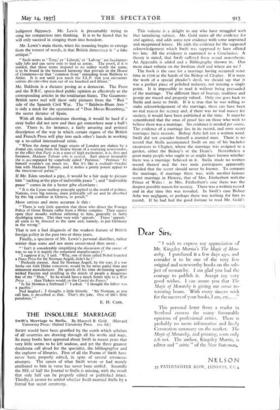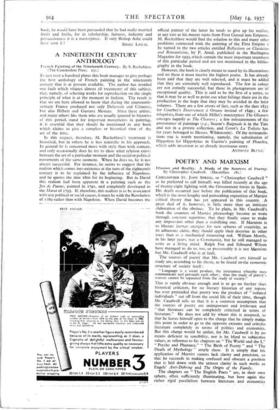THE INSOLUBLE MARRIAGE Swirr would have been gratified by the
comb which scholars of all countries arc drawing through all his works and ways. So many books have appeared about Swift in recent years that very little seems to be left undone, and yet the three greatest desiderata call aloud for the specialist, the bibliographer and the explorer of libraries. First of all the Poems of Swift have never been properly edited, in spite of several erroneous attempts. The canon of what Swift wrote or had merely attributed to him in verse has never been settled. Secondly the MS. of half the Journal to Stella is missing, with the result that only half can be properly edited or published intact. Thirdly, it cannot be settled whether Swift married Stella by a formal bUt secret ceremony.
This volume is a delight to any who have struggled with that tantalising subject.. Mr. Gold states all the evidence for and against, and adds some new evidence with some unprintcd and misprinted letters. He adds the evidence for the supposed acknowledgement which Swift was supposed to have offered too late. All the evidence is examined to a Conclusion. A theory is stated, that Swift suffered from sexual anaesthesia: An Appendix is added and a Bibliography thrown in. One more exact volume on the Swiftian shelf and where are we ?
The book is the case for a marriage having occurred some time in 1716 at the hands of the Bishop of Clogher. If it were the work of a special pleader's devil, we should say that it was a perfect piece of polished industry, not missing a single point. It is impossible to read it without being persuaded of the marriage. The different lines of hearsay, tradition and gossip are traced and properly valued. Only one goes back to Stella and none to Swift. If it is true that he was willing to make acknowledgement of the marriage, there can have been no real reason for secrecy and, if there was no real reason for secrecy, it would have been published at the time. It must be remembered that the onus of proof lies on those who wish to believe there was a marriage. No evidence is needed per contra. The evidence of a marriage lies in its record, and even secret marriages have records. Bishop Ashe left not a written word. Swift did not consider himself a married man. There is no record that Stella accompanied Swift on any of his bachelor excursions to Clogher, where the marriage was assigned to a garden, either the Bishop's or the Dean's. Nevertheless a great many people who ought to or might have known whether there was a marriage believed in it. Stella made no written record thereof and the two male participants apparently decided that the secret should never be known. To compare the marriage, if marriage there was, with another famous secret marriage in History, that of Mrs. Fitzherbert with the Prince of Wales : in Mrs. Fitzherbert's case there was the deepest possible reason for secrecy. There was a written record and in due time this was revealed. In Swift's case Bishop Ashe was negligent, or perhaps there was nothing for him to record. If he had had the good fortune to read Mr. Gold's book, he would have been persuaded that he had really married Swift and Stella, for in scholarship, fairness, industry and persuasiveness it is a masterpiece. If only Bishop Ashe could















































 Previous page
Previous page